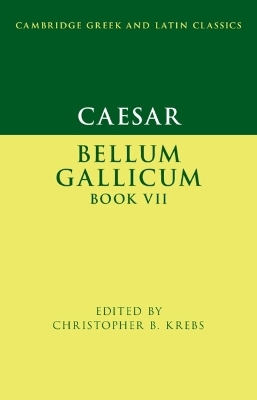
Caesar: Bellum Gallicum Book VII
Seiten
2023
Cambridge University Press (Verlag)
978-1-009-17712-2 (ISBN)
Cambridge University Press (Verlag)
978-1-009-17712-2 (ISBN)
The first commentary on Caesar's Bellum Gallicum to approach it as a literary text. Students will appreciate the drama of the narrative, the sustained intertextual borrowings and allusions, the rhetoric of the speeches, and the artistry of the language. Both author and text emerge in a completely new light.
This is the first commentary on Caesar's Bellum Gallicum to approach it as a literary text. It attempts a contextualized reading of the work through the eyes of a contemporary Roman reader, who was trained in rhetoric, versed in Greek and Roman literature, and familiar with the same political and cultural conventions and discourses as its author. In appreciating Caesar as a writer and situating the seventh book of the Bellum Gallicum within its 'horizon of expectations' and especially its historiographical tradition, it reveals much that rewards careful attention, including: a dramatized narrative, sustained intertextual borrowings and allusions (especially from and to Thucydides and Polybius), (in)direct speeches telling of Rome's second-greatest speaker, and word- and sound-play telling of the leading linguist, not to mention artful technical descriptions that lack parallels in the Roman republic. Ultimately, both author and text emerge as quite different from their grossly generalized reputations.
This is the first commentary on Caesar's Bellum Gallicum to approach it as a literary text. It attempts a contextualized reading of the work through the eyes of a contemporary Roman reader, who was trained in rhetoric, versed in Greek and Roman literature, and familiar with the same political and cultural conventions and discourses as its author. In appreciating Caesar as a writer and situating the seventh book of the Bellum Gallicum within its 'horizon of expectations' and especially its historiographical tradition, it reveals much that rewards careful attention, including: a dramatized narrative, sustained intertextual borrowings and allusions (especially from and to Thucydides and Polybius), (in)direct speeches telling of Rome's second-greatest speaker, and word- and sound-play telling of the leading linguist, not to mention artful technical descriptions that lack parallels in the Roman republic. Ultimately, both author and text emerge as quite different from their grossly generalized reputations.
Christopher B. Krebs is a Professor of Classics and (by courtesy) Comparative Literature and German Studies in the Department of Classics at Stanford University. The winner of the Christian Gauss Award and the AJP Best Article Prize, he is the author of A Most Dangerous Book: Tacitus's Germania from the Roman Empire to the Third Reich (2011) and co-editor of The Cambridge Companion to the Writings of Julius Caesar (Cambridge, 2017).
Preface and Acknowledgments; Introduction; Caesar: Bellum Gallicum Book VII; Commentary; Index personarum locorumque; Index rerum; Bibliography.
| Erscheinungsdatum | 18.07.2023 |
|---|---|
| Reihe/Serie | Cambridge Greek and Latin Classics |
| Zusatzinfo | Worked examples or Exercises |
| Verlagsort | Cambridge |
| Sprache | englisch |
| Gewicht | 653 g |
| Themenwelt | Geschichte ► Allgemeine Geschichte ► Vor- und Frühgeschichte |
| Geschichte ► Allgemeine Geschichte ► Altertum / Antike | |
| Geisteswissenschaften ► Sprach- / Literaturwissenschaft ► Anglistik / Amerikanistik | |
| Geisteswissenschaften ► Sprach- / Literaturwissenschaft ► Literaturwissenschaft | |
| Geisteswissenschaften ► Sprach- / Literaturwissenschaft ► Sprachwissenschaft | |
| ISBN-10 | 1-009-17712-5 / 1009177125 |
| ISBN-13 | 978-1-009-17712-2 / 9781009177122 |
| Zustand | Neuware |
| Haben Sie eine Frage zum Produkt? |
Mehr entdecken
aus dem Bereich
aus dem Bereich
auf den Spuren der frühen Zivilisationen
Buch | Hardcover (2023)
C.H.Beck (Verlag)
20,00 €
Konzepte – Methoden – Theorien
Buch | Softcover (2024)
UTB (Verlag)
39,90 €
Was Pompeji über uns erzählt
Buch | Hardcover (2023)
Propyläen (Verlag)
32,00 €


